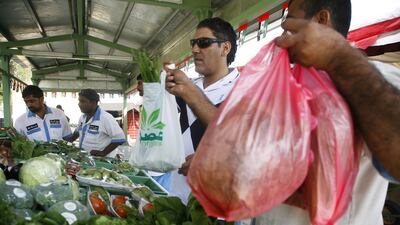DUBAI // Pale and misshapen tomatoes, crooked cucumbers and ugly aubergines deserve a second chance – and a new campaign aims to put them on your dinner plate.
Batches of locally grown organic fruit and vegetables, usually rejected by supermarkets because they “don’t look good”, could soon be displayed in separate aisles.
“The message is that these fruits and vegetables might look different but they taste the same, the quality is as good,” said Renu Ojha, general manager of Blue Planet Green People, an organic food shop in Dubai.
The campaign is called “I’mperfect”, and the company is working with the Ministry of Environment and Water to introduce it nationwide. They will encourage employers to use the food in work canteens, try to persuade supermarkets to sell it and host market days in schools.
Less attractive products don’t make it to supermarket shelves because of commercial concerns that customers will not buy them. Instead of the dinner table, they end up in landfills, are fed to farm animals or are used as compost and fertiliser.
“Supermarkets are choosy because of the fear that customers will reject tomatoes that are not really red, kale that is not bright green and cucumbers that are bent,” Ms Ojha said.
“Even before these reach the market, they are rejected not because of quality but because supermarkets want vegetables packaged to be the same shape, size and colour. We are in talks with the top five supermarkets so that imperfect produce grown locally will be displayed in separate aisles.”
About a third of food produced globally is wasted, about 1.3 billion tonnes, at a cost of Dh2.7 trillion a year, according to a 2013 report by the United Nation’s Food and Agriculture Organisation.
“This initiative is a way to forge new partnerships and create new ways of working,” said Mehdi Drissi, the organisation’s representative in the UAE.
There are 30,000 farms in the country, with 4,000 growing fruit and vegetables, of which 60 are certified as organic and produce more than 40 varieties of vegetables.
However, even before the produce leaves farms a large portion is set aside.
“It is not wasted. We recycle it as fertiliser or we cut the leaves for sheep and chicken, but to sell is better,” said Hafiz Moussa, project manager at Al Shuwaib organic farms in Al Ain and Abu Dhabi.
“We explain to people that we don’t use chemicals, so our produce grows in different sizes and colours.”
The campaign has urged schools to set up greenhouse projects, farmers’ markets and awareness programmes.
“It does not make sense that food can’t be sold if it does not look good, when there are poor who cannot afford it,” said Saisha Rao, 13, a pupil at the Millennium School, Dubai.
“It is shocking that food is rejected because it does not look charming,” said Magdoulene Assad, 14, from Gems Metropole School.
“Wasted food in landfills is a cause of global warming because it produces methane gas. This can be reduced.”
The Minister of Environment and Water, Dr Rashid bin Fahad, committed to minimising food wastage by 2021 at a recent forum on the subject in the Netherlands.
The new campaign ties in with the ministry’s aim to support local production, teach farmers how to harvest imperfect produce and educate the public, ministry officials said at the campaign’s launch.
rtalwar@thenational.ae


